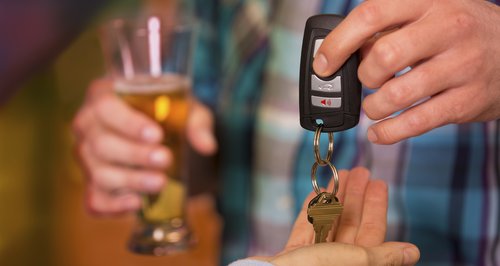On Air Now
The Capital Evening Show with Jimmy Hill 7pm - 10pm
13 December 2018, 06:17

The reduced drink-drive limit in Scotland has had no impact on cutting road accidents, a new study has found.
The Scottish Government cut the legal blood alcohol limit for motorists from 80 milligrammes of alcohol in 100 millilitres of blood to 50 in December 2014.
It argued the change would help save lives and make the country's roads safer.
But Jim Lewsey, professor of medical statistics at Glasgow University's Institute of Health and Wellbeing, said the "unequivocal" results of the research were this "simply did not have the intended effect of reducing RTAs".
The "most plausible" explanation for this "surprising" finding was the lower limit in Scotland was not backed up with sufficient police enforcement or media campaigning, he added.
The research, which was carried out alongside NHS Health Scotland, the University of Stirling and the University of East Anglia, looked at police data on road traffic accidents in not just Scotland but also England and Wales - where the drink-drive limit has remained at 80 millilgrammes of alcohol.
This was combined with market research data showing alcohol consumption rates - with the researchers believing the design of the study allowed them to isolate the impact of the policy change.
Prof Lewsey said: "Our findings are surprising, given what we know from previous international evidence, which generally supports a reduction of RTAs following the same lowering of a blood alcohol concentration limit.
"However, the results of our high-quality study are unequivocal - they indicate that the reduction in Scotland's drink-drive limit in December 2014 simply did not have the intended effect of reducing RTAs."
When the lower drink driving limit was introduced, then-Scottish justice secretary Michael Matheson said he believed the change would "not only reduce accidents but also reduce fatalities on Scottish roads and in that way make Scottish roads safer".
Prof Lewsey added: "In our view, the most plausible explanation for our findings is that the change in legislation was not backed up with additional police enforcement, nor sustained media campaigning.
"It is also perhaps an indication of the safety of Scotland's roads more generally, following continual improvements in recent years, and the fact that drink-driving is increasingly socially unacceptable."
He stressed: "Drink-driving remains highly dangerous and against the law. It is important to stress that these findings should not be interpreted to imply that any level of drink-driving is safe."
In response to the study Alison Douglas, chief executive of Alcohol Focus Scotland said: "Reducing the drink-drive limit was the right thing to do as the risk of having an accident rises in direct relation to the amount of alcohol consumed.
"The safest thing to do is avoid alcohol completely before driving. We need to increase public understanding and awareness of the risks and the limit."
There were at least 6,070 road traffic accidents in the UK in 2016 that involved drink-driving, while such incidents are estimated to cost the Scottish economy about £80 million a year.
The study, which was published in the medical journal The Lancet, also looked at the impact the lower limit had had on alcohol sales.
Here it concluded there had been no change to sales in supermarkets and off-licences, while sales in pubs, restaurants and bars were found to have reduced by less than 1%.
Scottish Conservative justice spokesman Liam Kerr said: "We warned at the time that the SNP Government was focusing on the wrong end of the scale with these changes.
"We wanted more attention on those whose irresponsible behaviour actually cause death and destruction.
"This report seems to back that approach up and I hope the SNP Government takes this on board.
"We all want to see a reduction in drink-driving and the accidents it causes, and it's vital that we work towards that."
SNP MSP Emma Harper responded: "The Tories are absurd and deeply irresponsible. They're attacking the SNP for leading the fight against drink-driving despite supporting us by voting for lower limits.
"And, to top off this hypocrisy, their own spokesperson was posing outside Parliament for a photo op for an anti-drink drive campaign which backs the Scottish Government's approach."
Meanwhile, a Scottish Government spokeswoman said ministers would look at the research "carefully".
She said: "The 2010 independent North Report found that drivers are six times more likely to die in a road traffic accident with a blood alcohol concentration between 50mg and 80mg than with zero blood alcohol.
"That is why the Scottish Parliament agreed unanimously to set the drink-drive limit based on the scientific evidence as to when impairment begins to increase significantly - bringing Scotland in line with most European nations."